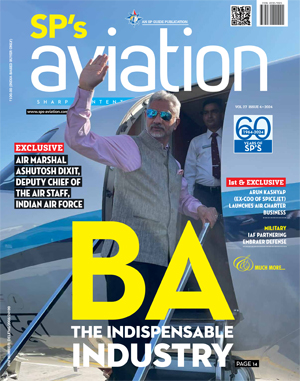INDIAN ARMED FORCES CHIEFS ON
OUR RELENTLESS AND FOCUSED PUBLISHING EFFORTS

SP Guide Publications puts forth a well compiled articulation of issues, pursuits and accomplishments of the Indian Army, over the years

I am confident that SP Guide Publications would continue to inform, inspire and influence.

My compliments to SP Guide Publications for informative and credible reportage on contemporary aerospace issues over the past six decades.
Managing Indian Skies

The function of accident investigation ought to be entrusted to a specialised body outside the civil aviation authority
The crash of Air India Express flight IX 812 at Mangalore on May 22, 2010, has once again triggered debate on the various issues related to civil aviation safety in India. Despite repeated assurance to the nation through the media by Union Civil Aviation Minister Praful Patel that the Indian skies are quite safe, the sector continues to be buffeted frequently by turbulence with a number of serious concerns continuing to agitate the public mind. One of the issues under public debate is the structure and quality of higher management of Indian civil aviation.
Usually, the responsibility for higher management of civil aviation is functionally segregated into operations, regulatory, air safety, etc, vested in different departments that enjoy some degree of autonomy but report to the head of the civil aviation organisation. Ideally, the function of accident investigation ought to be entrusted to a specialised body outside the civil aviation authority so that it is totally independent and not answerable to the head of the civil aviation organisation. The investigators determine as to what went wrong, identify deficiencies in the system, pinpoint lapses, fix organisational/ individual responsibility and recommend corrective or punitive action. Investigators can only be effective if they are independent of the organisation being probed.
In advanced nations, the responsibility for investigating accidents involving civil aircraft has deliberately been placed outside their respective civil aviation authorities. A few examples are the US National Transportation Safety Board, the UK Air Accidents Investigations Board, the Canadian Transportation Accident Investigation and Safety Board, and the Australian Transport Safety Bureau. These agencies are completely independent of the civil aviation authorities such as the Federal Aviation Administration of the US or the Civil Aviation Authority of the UK. These accident investigation boards are appropriately qualified, experienced and well-equipped to investigate aircraft accidents as also make relevant information pertaining to their findings and recommendations available in the public domain. In a democratic system of governance, people have the right to know.
In India, the situation is quite different. Here the responsibility for investigation into accidents involving civil aircraft is vested with the Directorate General of Civil Aviation (DGCA) which is the regulatory authority and is also responsible for air safety. This apex body, which is the equivalent of FAA or the CAA, is the final authority on all matters connected with civil aviation including accident investigation. However, this arrangement is somewhat incongruous. That the DGCA, responsible for air safety and regulatory functions should be vested with the authority to investigate aircraft accidents that could have been caused by their own shortcomings or flawed policy directives, is blatantly illogical.
There must be a clear separation of the two functions of regulation and aircraft accident investigation to obviate the possibility of the investigation degenerating into an in-house cover-up exercise or the dust being swept under the carpet. If the investigator is placed under or alongside the regulator to function under a common departmental head, he may find it awkward and inconvenient to be forthright and critical about the regulator. The investigating agency is unlikely to enjoy the discretion to pass judgement on the capability and performance of its own organisation.





